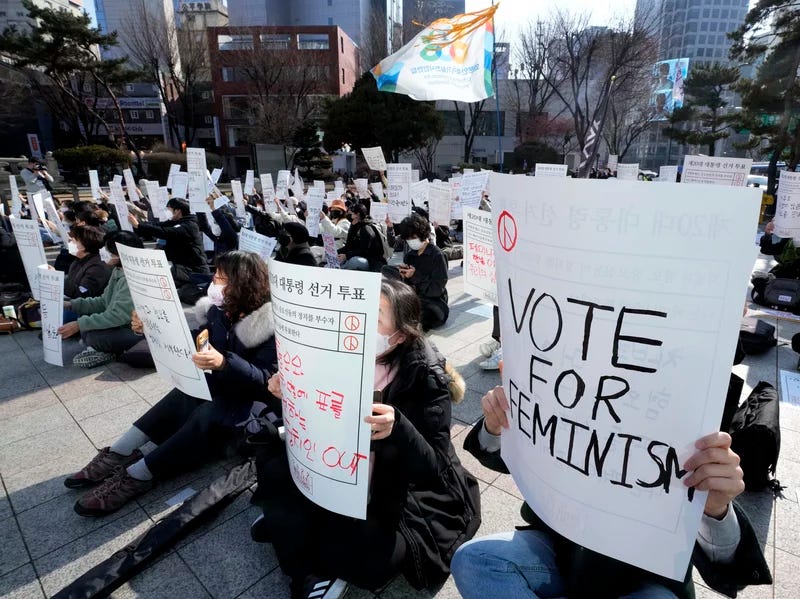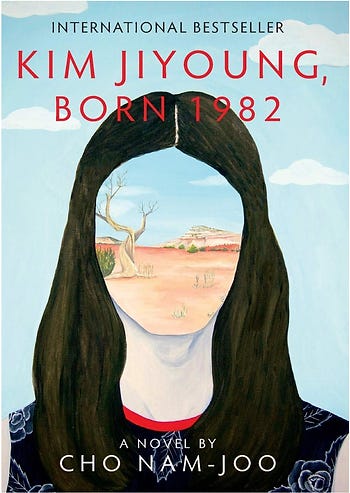Redefining Womanhood in South Korea: The Rise of the 4B Movement
How Modern Korean Women are Reshaping Tradition Through Rejection of Marriage, Motherhood, and Heteronormativity
The 4B Movement (meaning “Four Nos”) is a feminist wave in South Korea aimed at challenging deep-rooted gender norms. Rooted in four tenets—rejecting marriage, childbirth, dating, and heterosexual sex—the movement has catalyzed a cultural shift among young Korean women who seek a life free from traditional societal pressures. While the movement started as a niche reaction, it has since grown into a larger critique of the patriarchal values embedded within South Korean society.

Origins of the 4B Movement
The emergence of 4B can be traced to various factors, most notably the increasing frustrations with gender inequality in South Korea. Over recent years, the country has witnessed a significant surge in feminist discourse, largely in response to high-profile incidents of gender-based violence and sexism. Women in South Korea, faced with immense pressure to conform to traditional roles, began questioning the inherent inequalities of marriage and family life, especially as they witnessed the consequences of patriarchy in their daily lives.
One major trigger for the 4B movement’s expansion was the novel Kim Jiyoung, Born 1982 by Cho Nam-Joo. Released in 2016, the book became a cultural phenomenon and provided a lens through which many Korean women could examine their own lives and the societal structures influencing them.
The Role of Kim Jiyoung, Born 1982 in Shaping the Movement
Cho Nam-Joo’s novel tells the story of Kim Jiyoung, an ordinary Korean woman whose life reveals the systemic sexism woven into each phase of her existence. This resonated with countless women, sparking conversations that had previously been avoided in the public domain. The book explores how, from school to the workplace, Kim faces discrimination and societal pressures to conform to traditional roles. For readers, the novel was a mirror reflecting both individual and collective struggles, as well as the often-unspoken emotional toll of conforming to gender expectations.
This cultural catalyst offered women validation of their frustrations, helping them realize that these issues were not personal failings but part of a broader social structure that consistently undermines female agency. Many women within the 4B movement cite Kim Jiyoung, Born 1982 as a source of inspiration, validating their choices to step away from marriage, relationships, and motherhood. By embracing the tenets of 4B, these women are creating an alternative path where they prioritize personal freedom over societal expectations.
4B’s Core Principles and Goals
The 4B Movement advocates for freedom from four primary pressures:
1. No Marriage (Bihon): Rejecting marriage as a means to avoid traditional gender roles and the expectation that women must sacrifice personal ambitions for familial obligations.
2. No Childbirth (Bichulsan): Avoiding childbearing, partly to protest the expectation that women bear primary responsibility for family care and to challenge the notion that a woman’s purpose is tied to motherhood.
3. No Dating (Biyeonae): Many women in the movement reject dating, partly due to the dominance of male-centric dating dynamics that place emotional burdens and expectations on women.
4. No Heterosexual Relationships (Biseksu): Some members of the movement choose to forego relationships with men entirely, aligning with a vision of self-sufficiency that rejects patriarchal relationships.
Together, these tenets symbolize a departure from deeply ingrained social norms that traditionally shape women’s lives in South Korea. The movement represents a proactive decision to control one’s life trajectory, free from the constraints of cultural and familial expectations.
Society’s Response and the Ripple Effects
The 4B movement has encountered criticism and backlash from conservative sectors in South Korea, where traditional family values are highly esteemed. Some critics argue that 4B poses a threat to the country’s already declining birth rate and traditional family structure. Others see it as a necessary movement toward gender equality, pushing society to reconsider the rigid expectations it places on women.

Interestingly, the 4B movement’s popularity has coincided with record-low birth and marriage rates in South Korea, which have caused the government to reconsider its policies regarding gender equality and support for working mothers. Although the movement does not solely account for these demographic shifts, it highlights a broader generational shift in values and expectations.
Conclusion
The 4B Movement represents a profound rethinking of womanhood and personal agency in modern South Korea. Inspired by cultural shifts, personal experiences, and literary works like Kim Jiyoung, Born 1982, young Korean women are reclaiming their identities in ways that defy tradition. As they reject societal pressures, they challenge the country’s patriarchal norms and inspire others to envision new possibilities. Whether it is choosing a career over marriage, prioritizing personal fulfillment over familial expectations, or simply opting for a life free from conventional norms, the 4B movement empowers women to live on their terms.
Sources:
1. The Cut. “A World Without Men: Inside South Korea’s 4B Movement.” This article provides a thorough analysis of the 4B movement’s emergence, the challenges it poses to patriarchal norms, and its influence on young women in South Korea. Available at: The Cut (https://www.thecut.com/article/4b-movement-feminism-south-korea.html).
2. NextShark. “Giving up on Men: South Korea’s Viral ‘4B Movement’ Explained.” This source explores the movement’s foundations, alongside related initiatives like “Escape the Corset,” which rejects rigid beauty standards. Available at: NextShark (https://nextshark.com/4b-movement-korea-feminism/).
3. Yo Mama Rice. “Kim Ji Young, Born 1982 and the 4B Movement.” This blog post discusses the impact of Cho Nam-Joo’s Kim Jiyoung, Born 1982 on the movement, describing how it inspired women to confront societal expectations. Available at: Yo Mama Rice (https://www.yomamarice.com/post/4bfeministmovement).
4. The New York Times. “South Korean Women Are Leading a Movement to Abandon Marriage and Childbirth.” This article places the 4B movement
in the context of broader demographic and cultural changes, highlighting shifting perspectives on marriage and family life among young women. Available at:
The New York Times (https://www.nytimes.com/2020/12/29/world/asia/south-korea-women-4b.html)




